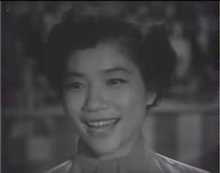- Chiemi Eri
-
Eri Chiemi
江利 チエミ
Chiemi Eri in 1952 film Mōjū tsukai no shōjoBackground information Birth name Kubo Chiemi Born January 11, 1937
Taitō, Tokyo, JapanDied February 13, 1982 (aged 45) Genres Jazz, Pop, Kayōkyoku, Enka Occupations Singer Years active 1952–1982 Labels King Records Chiemi Eri (江利 チエミ Eri Chiemi, born January 11, 1937, died February 13, 1982),[1] was a Japanese popular singer and actress.
Eri was born as Chiemi Kubo on January 11, 1937 in Tokyo, Japan. She started her singing career at the age of 14 with her version of "Tennessee Waltz." She sang American songs such as "Jambalaya" & "Come on-a My House". Eri started her career as an actress similar to Misora Hibari. Eri, Misora and Izumi Yukimura formed a trio. In her concerts, she was supported by Nobuo Hara's jazz band.[2]
Eri married Ken Takakura in 1959 but divorced in 1971.[3] She released single "Sakaba Nite" (酒場にて lit. "At The Bar") in 1974. The song was later included by omnibus album "Enka no Kokoro".[4]
Contents
Early Death
On the afternoon of February 13, 1982, Eri was found prone and not breathing on the bed of her Minato Ward apartment in Tokyo, by her manager. Her cause of death was listed as a stroke with asphyxiation due to vomit in the trachea. A further report indicated that while she had a cold and had already been drinking, a combination of whiskey mixed with milk, as well as cold medicine that she had heated up may have had a role in her death.
Filmography
She was an actress in 51 films[5]:
1950s
(1950s complete)
- 猛獣使いの少女 Mōjū tsukai no shōjo (1952)
- 母子鶴 (1952)
- 新やじきた道中 (1952)
- 青春ジャズ娘 Seishun Jazz musume (青春ジャズ娘) (1953)
- 陽気な探偵 (1954)
- ハワイ珍道中 (1954)
- So Young, So Bright (ジャンケン娘 Janken musume) (1955)
- ジャズ娘乾杯 (1955)
- ジャンケン娘 (1955)
- 裏町のお転婆娘 (1956)
- チエミの初恋チャチャ娘 (1956)
- チエミの婦人靴 (1956)
- 大暴れチャチャ娘 (1956)
- 花笠太鼓 (1956)
- Romantic Daughters (ロマンス娘 Romansu musume) (1956)
- サザエさん (1956)
- 恐怖の空中殺人 (1956)
- 歌う不夜城 (1957)
- Jazz musume tanjō (ジャズ娘誕生 Jazu musume tanjō) (1957)
- 続・サザエさん (1957)
- On Wings of Love (大当り三色娘 Ōatari sanshoku musume) (1957)
- 森繁の僕は美容師 (1957)
- 青春航路 (1957)
- サザエさんの青春 (1957)
- ロマンス祭 (1958)
- サザエさんの婚約旅行 (1958)
- サザエさんの結婚 (1959)
- サザエさんの新婚家庭 (1959)
- サザエさんの脱線奥様 (1959)
1960s
1970s -1980s
(1970s -1980s complete)
- 幕末 (1970)
- 喜劇 おめでたい奴 (1971)
- ちゃんばらグラフィティー 斬る! (1981)
- 巣立ちのとき 教育は死なず (1981)
Other songs
References
- ^ Chiemi Eri at the Internet Movie Database accessed 18 August 2008
- ^ "Hara, 82, to hang up saxophone". The Japan Times. 2008-12-03. http://search.japantimes.co.jp/cgi-bin/nn20081203f2.html. Retrieved 2009-02-12.
- ^ http://www.asiandvdguide.com/toei/hibari/hm2.html accessed 13 November 2008
- ^ (Japanese) "演歌のこころ (Enka no Kokoro)". NHK. http://shop.nhk-sc.or.jp/shop/g/gC20300009/. Retrieved 2009-02-11.
- ^ (Japanese) http://www.jmdb.ne.jp/person/p0107160.htm
External links
Categories:- Japanese female singers
- 1937 births
- 1982 deaths
- Japanese singer stubs
Wikimedia Foundation. 2010.
